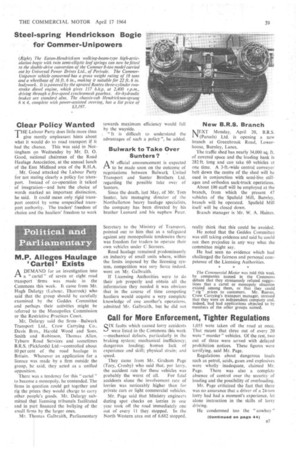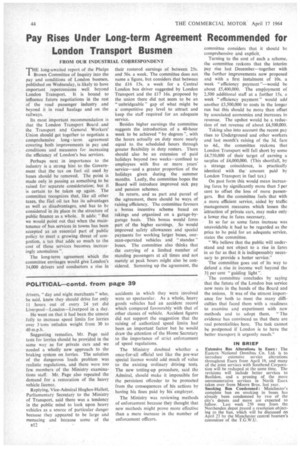Call for More Enforcement, Tighter Regulations
Page 41

Page 46

If you've noticed an error in this article please click here to report it so we can fix it.
SIX faults which caused lorry accidents were listed in the Commons this week —mechanical defects, particularly in the braking system; mechanical inefficiency; dangerous loading; human lack of experience and skill; physical strain; and speed.
They came from Mr. Graham Page (Tory, Crosby) who said that, per lorry, the accident rate for these vehicles was
probably the worst of all. For fatal accidents alone the involvement rate of lorries was noticeably higher than for private cars or light commercial vehicles.
Mr. Page said that Ministry engineers during spot checks on lorries in one year took off the road immediately one out of every 11 they stopped. In the North Western area out of 6,682 stopped,
1,055 were taken off the road at once. That meant that three out of every 20 were " murder" vehicles. Of the rest, two out of three were served with delayed prohibition notices. These figures were terrifying, said Mr. Page.
Regulations about dangerous loads such as petrol, acids, gases and explosives were wholly inadequate, claimed Mr. Page. There was also a complete absence of control over the security of loading and the possibility of overloading.
Mr. Page criticized the fact that there was no assurance that a. driver of a 24-ton lorry had had a moment's experience, ?et alone instruction in the skills of lorry driving.
He condemned too the " cowboy "
drivers, "day and night merchants" who, he said, knew they should drive for only 11 hours out of every 24 yet did Liverpool—London—Liverpool in a day.
He went on that it had been the utmost folly to increase speed limits for lorries over 3 tons unladen weight from 30 to 40 m.p.h.
Suggesting remedies, Mr. Page said tests for lorries should be provided in the same way as for private cars and we needed a wholly new approach to the braking system on lorries. The solution of the dangerous loads problem was realistic regulations, and there were too few members of the Ministry examinations staff. Mr. Page also repeated the demand for a restoration of the heavy vehicle licence.
Replying, Vice-Admiral Hughes-Hallett, Parliamentary Secretary to the Ministry of Transport, said there was a tendency in the public mind to look upon heavy vehicles as a source of particular danger because they appeared to be large and menacing and because some of the B12 accidents in which they were involved were so spectacular. As a whole, heavy goods vehicles had an accident record which compared favourably with that of other classes of vehicle. Accident figures did not support the suggestion that the raising of authorized speed limits had been an important factor but he would draw the attention of the Home Secretary to the importance of strict enforcement of speed regulations.
The Ministry doubted whether a once-for-all official test like the pre-war special licence would add much of value to the existing ordinary driving tests. The new totting-up procedure, said the Admiral, should make it impossible for the persistent offender to be protected from the consequences of his actions by having his fines paid by his employer.
The Ministry was reviewing methods of enforcement because they thought that new methods might prove more effective than a mere increase in the number of enforcement officers.




































































































































